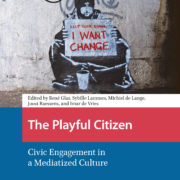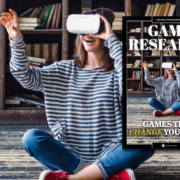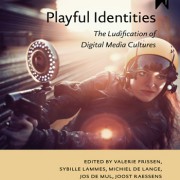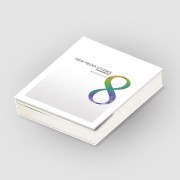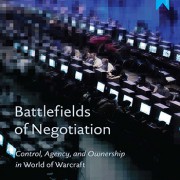Research Projects
Graduate Programme Game Research (2013-2018)
Games play an increasingly important role in education, healthcare, safety, and other economic and societal sectors. Games allow users to practice, experiment, research, and learn in a safe and motivating environment. The game-related training and research groups at Utrecht University are well positioned to benefit from, and contribute to, global trends towards gaming for training and entertainment. Five strong research clusters in game research contribute to this graduate program, from the following domains: Artificial Intelligence, Software Systems, Virtual Worlds, Interaction Technology, and Game and Play Studies. Together these clusters form the Utrecht Center for Game research and Technology (U-GATE). The focus of the research and education in the center lies on the computer science and humanities aspects of games. The graduate programme Game Research matches the most talented master students to top-scientists of the U-GATE center, with full freedom for students to follow their own research interest provided this fits in the general environment of one of the selected 5 top-level research groups of the university.
Project members UU/Humanities:
Prof. Dr. Joost Raessens
External project members:
Prof. dr. Sjaak Brinkkemper (Utrecht University – Computer Science)
Prof. dr. Johan Jeuring (Utrecht University – Computer Science)
Prof. dr. Marc van Kreveld (Utrecht University – Computer Science)
Prof. dr. Mark Overmars (Utrecht University – Computer Science)
Prof. dr. Remco Veltkamp (Utrecht University – Computer Science)
Prof. dr. Peter Werkhoven (Utrecht University – Computer Science)
Funding:NWO grant
Website
Persuasive gaming. From theory-based design to validation and back (2013-2017)
The research in this project is concerned with the characteristics, design principles, and effectiveness of persuasive gaming. We study gaming practices that combine the dissemination of information with attempts to engage players in particular behaviors and attitudes. A unique feature of the project is the collaboration with partners in the Dutch game industry enabling us to immediately relate and apply our knowledge drawn from Game Studies, Media Studies, validation research and research on Game Design to practical demands of the industry. Theoretically, we develop the innovative approach of a constant and intense interaction between what is drawn from theory with the actual design of game experiences. The subsequent merger between design and validation research provides a crucial testing ground to assess and validate the value of the knowledge we aim to produce. The process of persuasion is approached from a humanities perspective focusing on the interplay of different persuasive dimensions, including storytelling and playful interaction. The cases extend beyond traditional videogames incorporating also transmedia storytelling platforms and ambient games creating play experiences closely integrated in the context of e.g. city life, therapy or education. The ultimate goal is the construction of a dynamic model for persuasive game development and implementation that is accessible for the industry as well as the research community. We are confident that this close collaboration between the industry and the academic world will contribute to improving the international competitive position of the Dutch game industry.
Project Leader: Prof. dr. Joost Raessens
Project members:
Prof. dr. Jeroen Jansz (Erasmus University Rotterdam)
Prof. dr. Ben Schouten (Eindhoven University of Technology)
Dr. Teresa de la Hera (Utrecht University – postdoc)
Drs. Ruud Jacobs (Erasmus University Rotterdam – PhD student)
Drs. Martijn Kors (Eindhoven University of Technology – PhD student)
Jan Willem Huisman (Creative Director IJsfontein)
Bruno Felix (Creative Director Submarine)
Simulations and Simulation Games in Academic Education (2014-2016)
A project aimed to develop and sustain simulations and simulations games within Utrecht University’s institution-wide academic education. The goals is to support teaching staff to use simulations and simulation games to realizing learning goals ; develop and train core competencies of students; to train students to work in multidisciplinary settings around complex issues; to connect educational education to changing ways of learning of contemporary students.
Project Members UU/Humanities:
Dr. René Glas
Drs. Stephanie de Smale (Student Assistant)
Project Members:
Dr. Tom Overmans (Utrecht University – USBO, project lead)
Prof. Dr. Johan Jeuring (Utrecht University – Computer Science)
Dr. Wieger Bakker (Utrecht University – USBO)
Dr. Gerard van der Ree (Utrecht University College – Social Sciences)
Dr. Wim Dictus (Utrecht University – Medicine)
Funding: Utrechts Stimuleringsfonds Onderwijs
Go Go Gozo: Field-based learning – multidisciplinary mobile mapping methods (2015-2017)
An ongoing field-based encounter between students and staff from different disciplines, bringing together students with academic researchers from Geography, Sociology, Development Studies, Geoinformatics, Game Studies, Interdisciplinary Studies and New Media Studies in order to explore the links between mapping, mobility and play. It delivers informal learning, where students learn through playing location-based ‘serious games’. This takes place on the island of Gozo; small-enough to serve as a game-board, but large enough to offer a rich diversity of experience. Participants are drawn from Manchester and Warwick (UK), Malta, Utrecht (The Netherlands) and Olomouc (Czech Republic). The interplay between participants delivers a focused learning opportunity, during which mobile and ICT technologies will be deployed in location-based games to explore potential fieldwork methodologies.
Project Members UU/Humanities:
Alex Gekker
Dr. René Glas
External project members:
Chris Perkins (University of Manchester, project lead)
Funding: Erasmus+
Games and social change: In-between screens, places and communities (2013-2015)
This network will explore the burgeoning ‘Games for change’ movement that has emerged in the last decade, which has appropriated to engage people beyond entertainment. A growing number of artists, educationalists and activities are developing games that contend with personal, social and political subject matter, e.g. poverty, immigration, fiscal crisis, with the explicit intention of altering or affecting player opinion outside of the game world. The network will also focus on games which allow immersive and interactive storytelling experiences to play out across a range of trans-media platforms, such as Alternate Reality Games (ARGs) and Urban Games, which engage with social justice, community and humanitarian issues.
Project members UU/Humanities:
Prof. Dr. Joost Raessens
External project members:
Dr. Scott Gaule (Manchester Metropolitan University – UK)
Funding:Other grant (government funding): Arts & Humanities Research Council (UK) – Game changing research networks for the Video game industry.
Website
Creative Territories: Exploring Innovation in Indie Game Production Contexts and Connections
The number of micro and SME businesses has grown post-recession. This network will bring together leading international and UK scholars, indie games developers and creative industry stakeholders to examine this transformation of the young but highly significant video games industry to identify how it makes possible new kinds of cultural production, collaboration and creativity. The research aims to formulate and ‘map forward’ the key processes and connections that represent commercially viable, creatively sustainable and culturally valuable pathways for the development of this sector so that it lives beyond its early ‘bubble’ and makes a significant difference in video game production as both economically and culturally valuable form.
Project members UU/Humanities:
Prof. Dr. Joost Raessens
External project members:
Patrick Crogan (University West of England – UK)
Funding: Other grant (government funding): Arts & Humanities Research Council (UK): Game changing research networks for the Video game industry
Website
ERC Starting Grant: Charting the Digital – Digital Mapping Practices as New Media Cultures (2011-2016)
The key objective of this research programme is to investigate to what extent and how digital maps can be considered as new techno-cultural phenomena that have altered our way of being in and moving through our spatial environments. Digital maps allow a greater degree of interaction between users and mapping interfaces than analogue maps do. Instead of just reading maps, users have far more influence on how maps look. Whether a navigation device that adjusts its route-display according to where the driver chooses to go, or a map in a computer-game that is partly created by players, maps have become more interactive and are now co-produced by their users.
Part of this extensive research project investigates how digital maps are related to play. It focusses on a two-fold cultural paradigm shift that occurred since the emergence of digital maps and a parallel process of cultural ludification. Theses two shifts come together in a myriad of playful mapping practices that people nowadays engage with and that will be examined in this project.
Games for Health Europe
Games for Health Europe brings together researchers, medical professionals and game developers to share information about the impact games and game technologies can have on health, health care and policy. A major effort of the Games for Health Europe is the annual Games for Health Europe Conference. Over three days, more than 400 attendees participate in over 60 sessions provided by an international array of 60+ speakers, cutting across a wide range of activities in health and health care. Topics include exergaming, physical therapy, disease management, health behavior change, biofeedback, rehab, epidemiology, training, cognitive health, nutrition and health education. After three years in Amsterdam, the conference has moved into Utrecht, where it enjoys a growing collaboration between the academic, municiplal and entrepreneurial elements of the region.
Project members UU/Humanities:
Prof. Dr. Joost Raessens
Alex Gekker
International Master Degree Game Studies (2011-2012)
Onderzocht zal worden hoe een twee jarige (120 ECTS) internationale Master Degree Game Studies opgezet kan worden. Ook zal bekeken worden of, en zo ja op welke wijze, deze master geïntegreerd kan worden in de Research Master Media and Performance Studies. In het beoogde Master programma zal samengewerkt worden met de Research Master Game and Media Technology, onderdeel van de Graduate School of Natural Sciences, Faculteit Bètawetenschappen.
Project members UU/Humanities:
Dr. René Glas
Dr. Sybille Lammes
Prof. Dr. Joost Raessens
Funding: Utrecht University
GATE: Knowledge Transfer Project – Mobile Learning (2010-2012)
To use mobile applications and games for learning purposes an appropriate use of design principles for story-telling, spatial indication and social networks is indispensable. To improve learning results, stories have to be aptly integrated in game-play, maps have to be properly incorporated in the game and must be open for development by players, and social networks have to facilitate a sharing of learning results and processes. In this Knowledge Transfer Project (KTP) we want to use and apply the knowledge that has been gained in GATE work package 4.2, Design Rules for Learning through Simulated World (see below), about these three areas in order to improve and evaluate the learning results of mobile applications and games that are developed by 7scenes. This KTP will also function as a practical benchmark to further substantiate the design principles that Utrecht University has developed in work package 4.2. The project runs from 2010 till 2012 and involves Utrecht University/GAP and 7scenes as main partners, with further involvement from the MIT Scheller Teacher Education Program, Parsons’ The New School for Design and Waag Society.
Researchers: Prof. dr. Joost Raessens, Dr. Sybille Lammes, Dr. René Glas, Teun Dubbelman
Partners: Waag Society, 7scenes
Funders: ICT Regie/NWO
Website
GATE: Game Research for Training and Entertainment (2006-2012)
Serious games can enable players to acquire and improve domain specific knowledge and sharpen cognitive skills such as spatial abilities, media literacy, decision making and problem solving. New models have been developed that can help game designers and developers to discuss and improve the design and learning effects of educational games. Although serious games have become a very popular medium, developers still require theoretical models that can help them to improve the design and thereby the learning results of serious games. This research wants to fulfill this need by focusing on three specific topics: how meanings are made through games and game play, how narrative structures can be designed to improve learning processes, and how rhetorical strategies can be designed to convince players of certain perspectives (e.g. political games), or behavioural changes (e.g. health games). With the insights gained from this research, we will formulate specific design rules for game-based learning.
Researchers: Prof. dr. Joost Raessens, Prof. dr. William Uricchio, Prof. dr. Paul Kirschner, Dr. Chiel Kattenbelt, Dr. Sybille Lammes, Dr. René Glas, Valentina Rao, Teun Dubbelman
Funders: ICT Regie/NWO
Website
NWO Research Project Playful Identities: From Narrative to Ludic Self-Construction (2006-2010)
The aim of this interdisciplinary (conceptual-philosophical, media-theoretical, and qualitative-empirical) program is to investigate if, and if so, to what extent and in what way, digital information and communication technologies are transforming the (construction of) personal and cultural identity. To that end we will develop a theory of ludic identity that critically elaborates on Ricoeur’s theory of narrative identity. In this theory play and games are not only appropriate metaphors for human identity, but they are also conceived of as means by which people reflexively construct their identity.The theory of ludic identity, the outlines of which have been sketched in some of the principal applicants previous publications, will be further developed and critically evaluated in three case studies (three PhD projects) focusing on (the domestication of) three different media, respectively: 1. mobile phones, 2. websites, and 3. computer games. Each case study will examine the way the medium-specific characteristics shape and are being shaped by the participation of the user, and on the implications of this for the reflexive construction of personal and cultural identities. By way of dialectical counterpoint, in each of the case studies the practice of reflexive identity construction will be confronted with a specific development that threatens to subject this reflexive self-construction to the logic of an external system (respectively processes of commercialization, globalization and homogenization). The applicants will not only act as the supervisors of the PhD projects, but will also write a synthetic monograph in which the results of the case studies will be integrated and situated in a wider context of historical and philosophical approaches to culture.
Researchers: Prof. dr. Jos de Mul, Prof. dr. Valerie Frissen, Prof. dr. Joost Raessens, Dr. Sybille Lammes, Dr. Michiel de Lange, Dr. Jeroen Timmermans
Partners: Erasmus University, TNOFunders: NWO
NWO Research Project Postcolonial Playgrounds: A Study of the Cultural Meanings of Computer Games that Centre around the Colonisation and Mapping of Landscapes (2004-2009)
Since computer games have become an important part of contemporary popular culture, a wide variety of games have emerged that invite players to colonize, conquer and map new territories, along the way increasing their resources and technological knowledge. Such games refer to a past when the exploration and mastery of new lands and resources was intrinsic to western power politics. At the same time such games rework this past. They are contemporary and postcolonial means of expressions that revisit and re-mould the past in order to make sense of the present.This research project investigates how such games “handle” history, colonialism, mapping and the gaining of capital and techno-scientific knowledge. How can they be understood as postcolonial expressions? How do they relate to the past and how do they rework notions of expansionism, exploration, travelling and knowledge? Through an ethnographic analysis of the games, as well as of subcultures and fan-cultures that have materialized around them, more insight will be gained in these questions.
Researcher (PI): Dr. Sybille Lammes
Funders: NWO Innovational Research Incentives Schema, VENI


